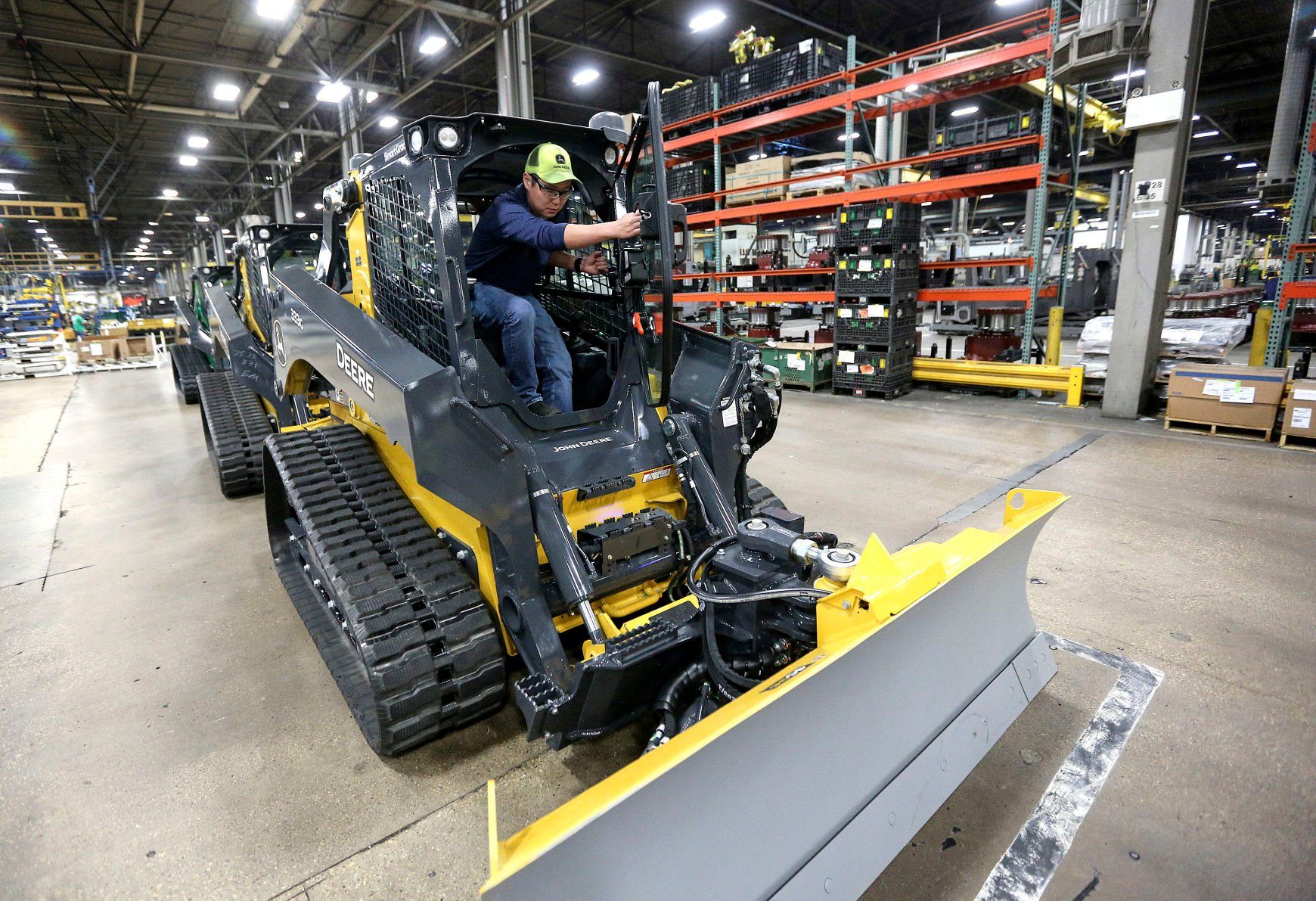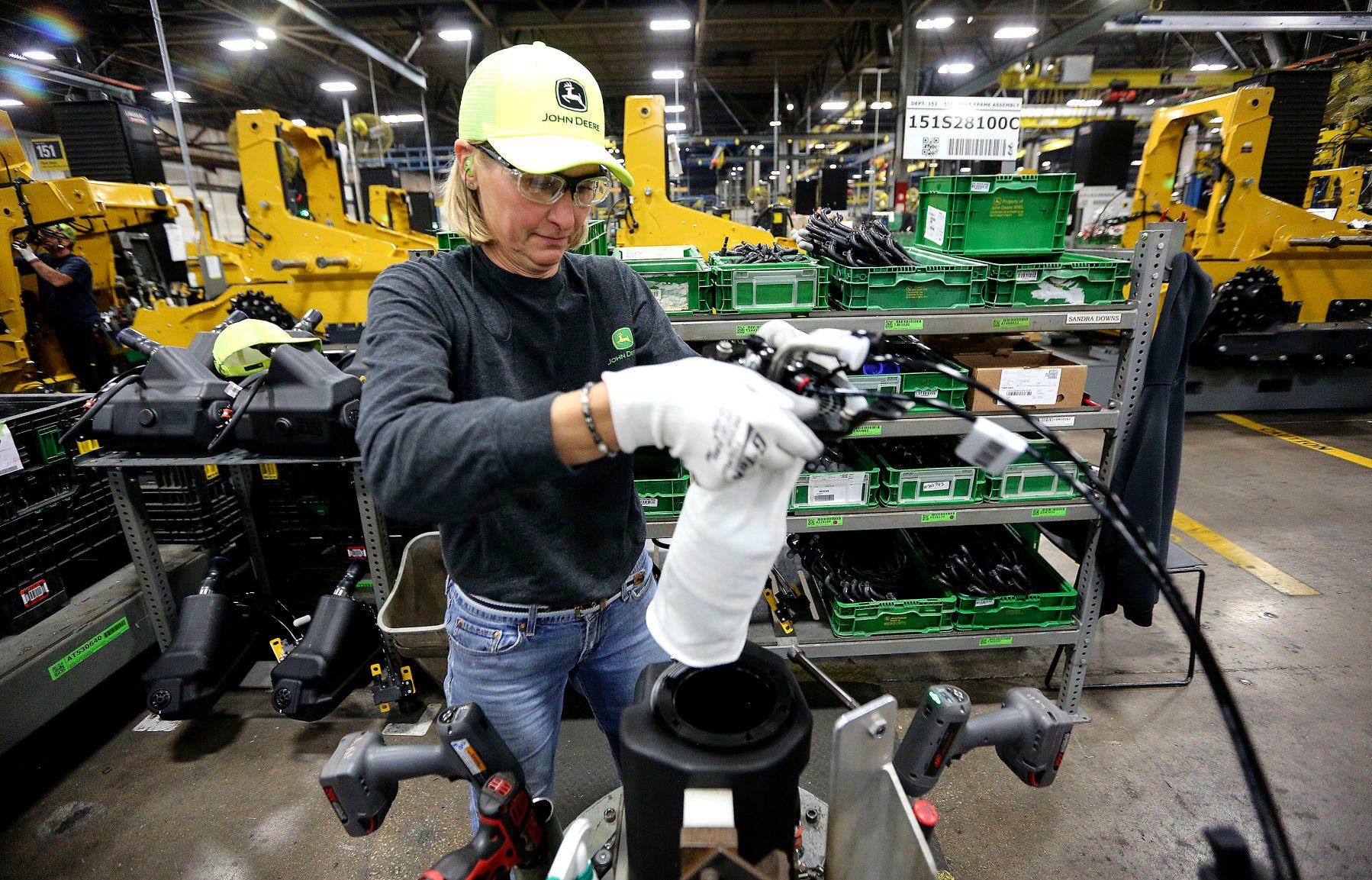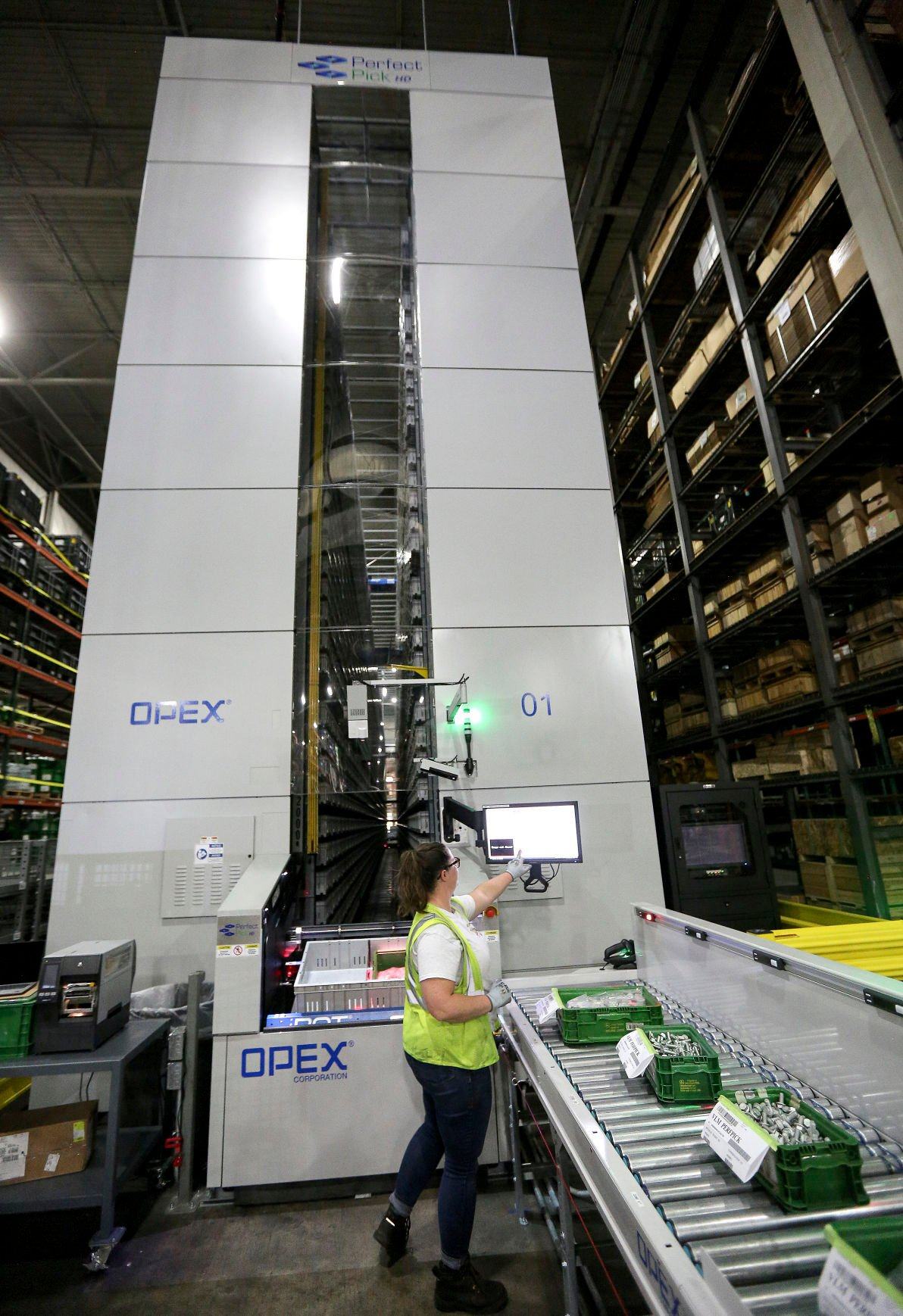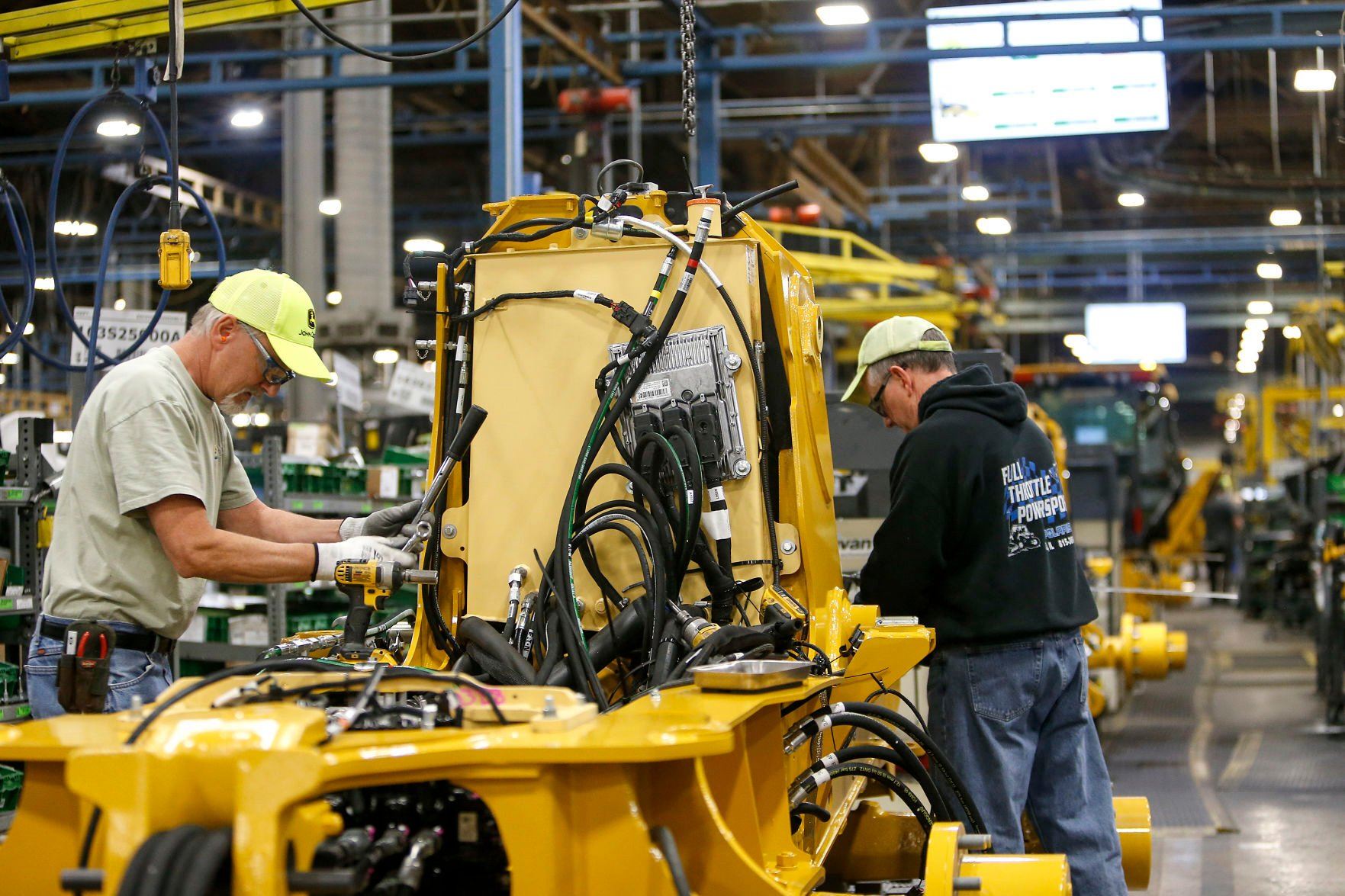John Deere Dubuque Works is Dubuque County’s and the greater Dubuque area’s largest employer with about 3,000 employees.
Greater Dubuque Development Corp. tracks employee data on an annual, rolling basis. Here are the area’s other top 10 largest employers, according to GDDC.
- Dubuque Community School District — 2,000 employees
- MercyOne Dubuque Medical Center — 1,440 employees
- Medical Associates Clinic — 1,100 employees
- University of Wisconsin-Platteville — 1,060 employees
- UnityPoint Health-Finley Hospital — 1,012 employees
- Cottingham & Butler — 800 employees
- Andersen Windows and Doors — employee number listed as “confidential”
- City of Dubuque — 737 employees
- Sedgwick — 700 employees
In the 18 years Sandra Downs has worked for Dubuque County’s largest employer, she has felt the impact of her work.
“I’m proud when I’m going down the highway and I see a truck with a product I made,” said Downs, an assembler at John Deere Dubuque Works. “I’m proud when I’m watching the hurricane relief and (see Deere vehicles and) I say, ‘Yes, John Deere.’ It makes me proud to be a part of it.”
John Deere Dubuque Works this year is marking 75 years in the community, as the first tractor rolled off assembly lines in 1947.
The plant now has about 3,000 employees and spans about 1.2 miles in length. Mark Dickson, general manager of John Deere Dubuque Works, said the plant has built about 1.2 million machines.
“We started out with a simple little tractor,” he said. “Now, we produce 15 different product lines.”
The plant’s impact extends beyond the factory and into the wider community. Dubuque Mayor Brad Cavanagh noted Dubuque Works employees have families who attend schools and serve as leaders in the community.
“They are a little bit outside of town, so people don’t always drive by there,” he said. “People do need to fully understand the huge impact that it has on Dubuque and be proud of it.”
Dubuque Works also has a broad economic impact that extends outside its walls. Rick Dickinson, president and CEO of Greater Dubuque Development Corp., noted that the plant has multiple suppliers in the greater Dubuque economic region.
“John Deere is the Jupiter of our economic solar system, meaning they are the largest employer, have the greatest dollar output, have the most employees and are great corporate citizens engaged in all things in the community, both as a company and valued employees,” he said.
HISTORY IN DUBUQUE
In 1945, Deere & Co. announced that Dubuque had been picked as the site of a new plant, which would be located on a 328-acre plot a little over two miles north of Dubuque city limits.
A Telegraph Herald published Feb. 7, 1945, states that the community was selected by Deere “as a suitable place for post-war expansion of the big firm, according to M.A. Frasher, a representative of the company now in the city, because of excellent transportation facilities and because of its geographical relation to other company plants in Moline (Ill.), Waterloo (Iowa) and Ottumwa (Iowa).”
At the time of Dubuque Works’ opening in 1947, the plant had 600 employees.
In the late 1960s and 1970s, the factory transitioned from producing agricultural machinery to construction and forestry products, which has been its focus ever since, Dickson said.
A July 20, 1997, TH article commemorating 50 years of Dubuque Works stated that the plant produced more than 28,115 units and made over $1 billion in sales in 1978, when housing starts were at a high and interstates expanded.
However, the article also noted that “interest rates skyrocketed and housing starts plummeted” in the 1980s, greatly impacting the plant and forcing layoffs and contributing to high local unemployment rates. A five-and-a-half month strike began in 1986.
Eventually, though, business rebounded for the Dubuque Works plant.
“The factory formed teams of wage and salary employees to work on solving problems, such as manufacturing a lower-cost winch,” the 1997 article reads. “Other advancements were made in quality and safety, and in 1993 the Dubuque Works made a profit for the first time in 13 years.”
Dickinson noted that Dubuque Works had fewer than 1,500 employees in the 1980s after having 8,000 in the 1970s.
“Their employees have grown dramatically since the dark days of the ’80s, and they have just become more productive,” he said.
Dickinson said he has seen Dubuque Works expand dramatically in his 27 years with GDDC. In that time, Deere has relocated skid steer loader operations from Tennessee to Dubuque, as well as moved all forestry equipment to the local facility and expanded itslocal engineering capacity.
“They have greatly expanded their product line to be the premier construction company in the world,” Dickinson said.
Dickson said that in the past 10 to 15 years, the plant has focused on boosting product lines and expanding options for customers. More recently, he said, Dubuque Works has emphasized bringing more technology to customers, making more efficient fleets and producing more sustainable solutions.
Cavanagh said John Deere Dubuque Works has played a huge role in the city’s development over the years, including for local companies that are John Deere suppliers.
“I grew up here,” he said. “John Deere, I think, has touched everybody in some way. I have family members who have worked there in different capacities, and I think that’s a really common story.”
A TECHNOLOGY FOCUS
The current sprawling John Deere Dubuque Works facility looks something like its own metal city, with manufacturing, training and testing areas scattered throughout.
Each area is focused on a specific product line, with screens telling employees the progress they have made to reach the day’s scheduled amount of work.
Jeff Behan, manager of the smart connected factory, said that focus on technology has allowed John Deere to better streamline the manufacturing process. The plant uses tools to take a 3D design and plan out the entire production process for a machine. In the past few years, 80 different applications have been created to better the manufacturing process, he said.
He said that automated processes, such as a robotic paint system, have made work both easier and safer for employees.
“About 85% of our welding wire is placed robotically,” he added.
For the past nine months, the plant has had two automated fork trucks that deliver parts from one side of the plant to the other. Behan said the trucks — named “Sugar” and “Spice” — find the route to their endpoint on their own and can sense when obstacles might be in the way.
“It’s a great save overall from the time it takes to run it to the other side of the building,” he said.
Another time saving-machine can be found in the warehouse, which Dubuque Works runs in partnership with Hodge. The “Perfect Pick” machine, which arrived at the Dubuque plant last week, is an automated system that loads smaller parts into the warehouse so they can be stored for when they are needed.
“It’s a very innovative solution,” Dickson said. “It’s our intention to add another one.”
STRONG RELATIONSHIPS
Still, Dickson stressed that the advancement in Deere’s work would not be possible without its employees.
“We can’t deliver that technology without the product and machines that our people build,” he said. “… And with the pandemic, we never missed a day. When you think of the challenges with the supply chain, we still found a way.”
He said the company continues to improve safety and quality for its employees and fosters good relationships, including with its union workers.
Last year, Deere & Co. employees who were members of International Union, United Automobile, Aerospace and Agricultural Implement Workers of America — a union that includes John Deere Dubuque Works employees — went on strike for five weeks before ratifying a new contract with Deere.
Dickson emphasized the importance of Deere’s union workers and said the company’s relationship with its employees is “stronger than it’s ever been.”
Dickson said Dubuque Works also prioritizes giving back to the community, with many employees engaging in volunteer work.
“People understand how important John Deere is, and we understand how important the community is,” he said. “… We give well over half a million dollars to the community every year. We can’t have a great factory without a great community.”
A LOOK AHEAD
Looking ahead, John Deere Dubuque Works has plans to continue delivering higher tech and sustainable products.
Zimin Vilar, battery electric vehicle platform manager at the plant, stressed the importance of sustainable machines in the coming years.
“John Deere has made a commitment to deliver 20 electric battery or hybrid products by 2026,” she said.
While the facility already makes backhoes on site, Vilar said, a prototype has been designed for the first fully battery-powered electric backhoe, which eventually will be produced at the Dubuque plant.
“We are very much a design center in Dubuque,” she added. “This is the technical engineering mothership location.”
Andrew Kahler, manager of technology solutions at Dubuque Works, said the plant’s engineers have been working on technology that will better help customers and suppliers.
“We’re focused on not just technology for technology’s sake, but to help our customers overcome the challenges they’re facing,” he said. “And the first three of those are labor, labor and labor. It’s hard to find operators. It’s hard to find foremen. We are focused on deploying tech so our customers can get more done with their existing workforce.”
Kahler said customers’ No. 1 concern on job sites is safety of crews, and technology Deere is designing reflects that, including installing radar to help machines alert operators when objects and people are close by.
Those efforts also include machines with SmartGrade technology, which already is being used on Dubuque Works skid steers. A GPS device allows an automated blade to put dirt in the right spot the first time, which Kahler said increases productivity by 15% to 30%.
A COMMUNITY ASSET
Dickson said John Deere Dubuque Works actively is hiring for a variety of jobs as the facility continues its efforts with technology. Those additional workers, in turn, add to the fabric of the wider community.
“We’re also bringing in a lot more high-tech jobs to the community,” he said. “And if you’re growing in the high-tech market, you better be an inclusive community. We are committing to making Dubuque a better place to live and to work.”
Vilar, who has lived in Dubuque for 15 years, said she already has seen Dubuque evolve in her time here. She came to the area from China after graduating college.
“If John Deere didn’t bring me here, I would probably be on the East Coast or West Coast or have moved back to China,” she said. “When I came here, there were no Asian grocery stores, and now there is. It’s small, but it’s important.”
Downs said a sense of community also exists at the facility, where her coworkers have made the biggest impact on her career at Deere. Her son, Blaine Stahr, also works at Dubuque Works, as do two of her cousins. She also has an uncle who is a former employee.
“I think that your job should be 50/50,” she said. “It’s half of what you do and half of who you work with. It makes it more enjoyable.”
Dickinson said the people who work at the Dubuque plant have been and continue to be the greatest asset to the community.
“I think it brings a global brand to Dubuque,” he said. “It’s one of those things that makes Dubuque, Dubuque. It puts us on the map in many ways.
“You may not know how to spell Dubuque, but you can spell John Deere,” he said, laughing.









